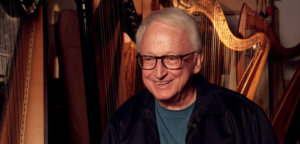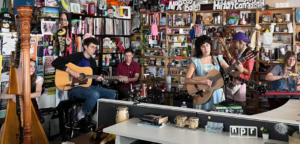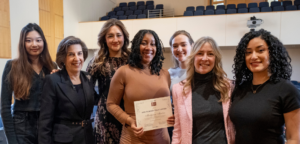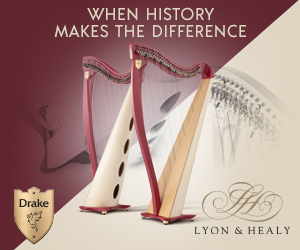Q and A with Grace Bauson on winning a job that takes more than just harp chops.
In order to win over the jury for the principal harp job with the U.S. Army Field Band, Grace Bauson not only had to wow them on the harp’s 47 strings, but she also had to convince them with her skills on the piano’s 88 keys. When the Army Field Band posted their opening for a principal harpist and pianist this past winter, many harpists were left wondering who would have the diverse skill set to master two very different and demanding instruments in an audition. Well, we have our answer: Grace Bauson. The musician, who identifies herself as a harpist before a pianist, tells us how she prepared for and won the unique position.
Harp Column: Why did you decide to audition?
Grace Bauson: I was freelancing and involved in many different organizations at the time. While I loved everything I was doing, I knew that in order to grow as a person I needed to shift my focus a little. At the time that this audition came up, I was looking for avenues to make that change happen. The fact that I could potentially use two of my skills in a variety of ways really appealed to me. Of course the steady income and benefits were also a nice incentive!
HC: Who was on the jury?
GB: My jury consisted of multiple people and grew throughout the day. It was primarily the conducting staff and senior enlisted leaders of the Concert Band and Soldiers’ Chorus, plus the harpist for the U.S. Army Band, “Pershing’s Own.”
HC: How many applicants participated in the audition?
GB: There were other applicants in the CD round, but mine was the only live audition.
HC: Since the job was posted as a harp/piano position, what were the requirements for the audition, and how did you prepare for the challenge of auditioning with both instruments?
GB: The audition list consisted of standard harp excerpts, solo works of my choice, and arrangements done by the U.S. Army Field Band’s in-house arranging staff, plus sight-reading and an interview.
After advancing to the live round, I realized that there was potential for success and it was time to get motivated! I had a little over a month to prepare, so I stopped taking gigs and asked my students to go to an every-other-week schedule.
One of the piano excerpts was a jazz chart, something I had never seen before. I started taking jazz piano lessons. To get quality practice time on each piece, I alternated practice days between instruments. I did a lot of listening, played along with recordings, and scheduled a few practice run-throughs with harpists and my piano teacher.
During the final week of preparation I shifted my focus to the other aspects of the audition, including the interview, people I might meet, and organizational mission and values. My parents gave me a mock interview, I talked to and reviewed notes from people who had military band experience, and I searched the web for bios and articles.
HC: We’re curious how you juggle two different instruments. Do you consider yourself more of a harpist or a pianist?
GB: I consider myself more of a harpist. My doctorate, master, and bachelor degrees are all in harp performance, and my teaching positions and gigs are with the harp. I started as a double major in harp and piano performance, but by the end of my sophomore year I was struggling to practice enough on both instruments. I chose to focus on the harp. Since that time, the piano has been more of a back-burner skill. To keep playing the piano, which I enjoy, I took piano pedagogy courses in graduate school, have taught individual and group piano lessons, and have been fortunate to have church jobs throughout my career.
HC: Tell us about your experience at the audition. What were the most memorable, challenging, or fun aspects?
GB: I was very impressed with the audition experience. Master Sergeant Wood and Sergeant Major Marshall gave me a tour of the building, answered my questions, and generally made sure everything went smoothly from the beginning to the end of the audition. I was able to go a day early to meet the musicians and staff and practice in the audition space.
One of the best parts of the audition was playing with other musicians. Playing a few pieces on the harp with band and on the piano with the chorus was part of my audition. I also had the chance to accompany Sergeant First Class Jennifer Everhart on clarinet, which was pretty fabulous.
Something that I really loved was the spirit of welcome and encouragement. It was clear from working with SFC Everhart and the soloists in the Soldier’s Chorus that they were willing collaborators and wonderful musicians. When I was asked to adjust certain aspects of my playing on a second run-through, they also adjusted their playing or singing to help me succeed.
A challenging aspect that every candidate must go through is the pressure to perform well throughout the entire audition. I was only in the spotlight for a few hours, but keeping up my mental and physical energy was a challenge. I also experienced playing with a jazz combo for the first time, which was a terrifying prospect. However, once again, the musicians were so kind that even that became an affirmative experience. Overall, I had a very positive audition experience and hope that others will have the chance to experience a similar situation in their auditions.
HC: What are you most looking forward to about the new position?
GB: It’s hard to choose just one thing I’m looking forward to about the new position. Here are a few. I am excited to be challenged to play at a new level with such incredible musicians. I am looking forward to traveling and hopefully reconnecting with friends and family who are spread across the United States. I am excited about the ability to offer educational opportunities in the form of masterclasses and workshops at different schools during those tours. I will also be glad to narrow my focus to developing skills in a new organization. •












